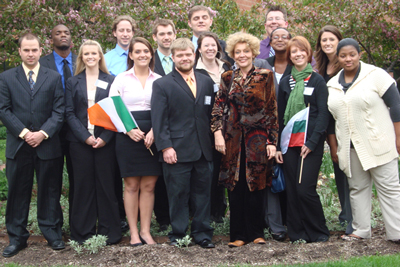
UMSL political science and business administration students visit IUPUI to participate in the 19th Midwest Model European Union.
This weekend, a group of political science and business administration students at the University of Missouri–St. Louis had to refrain from thinking like Americans. They had to see the world through the eyes of delegations from Bulgaria and Ireland. It was those two countries the students represented in the 19th Midwest Model European Union.
The annual event was held April 21-23 at Indiana University-Purdue University Indianapolis. More than 160 college and university students participated in simulations by depicting prime ministers, presidents, ambassadors, commissioners, ministers and diplomats for the 27 nations that constitute the European Union. They spent the weekend working toward European unity through policy making, dispute resolutions and building compromise.
The UMSL participants are students of Joyce Mushaben, professor of political science, and Elizabeth Vining, assistant teaching professor of marketing.
“Students learn the importance of language in negotiations and how difficult it is to reach real political and economic compromises among 27 different nations with often conflicting national needs and interests,” Mushaben said of the Midwest Model EU. “They are required to view these issues through the eyes of the countries they negotiate, rather than through American ‘free market, anti-government’ rhetoric.”
Each university is allowed to express a preference for specific countries they’d like to represent. But they are ultimately assigned countries by the Midwest Model EU’s coordinator, who Mushaben said attempts to balance every school’s interests.
Once the students arrived at IUPUI for the Model Midwest EU, they began analyzing proposals submitted by their peers on issues that currently face the EU and set about determining how they should be resolved.
“Each student is expected to understand how their country would respond to each issue, as well as where the EU is presently,” Vining said. “It often makes for lively discussions.”
The students then spent the first full day of the event peppering a guest speaker from the EU with questions and working in groups to tackle issues, sometimes forming joint sessions on certain matters of contention.
Students from each ministry cap the event by voting for the delegate they feel most effectively represented their country.
Mushaben said students develop a deeper appreciation for holistic approaches to complicated policy problems and learn the lesson that all members of the EU can be effective in finding compromises that maximize the well-being of all European citizens.
Adis Alagic, a junior majoring in political science at UMSL, portrayed Nickolay Mladenov, the minister of foreign affairs for the Bulgaria. Alagic said he felt the UMSL students did an excellent job preparing for the event and contributing to discussions – not an easy task when representing smaller, less influential nations.
“I was slightly upset that we didn’t receive any best delegate awards, especially as I had heard excellent remarks throughout the event about many of our delegates,” Alagic said. “Overall, though, it wasn’t about winning awards. It was about the experience, and the experience was excellent.”
More info:
umsl.edu/~polisci/faculty/profiles.html#mushaben
umsl.edu/divisions/business/faculty/marketing/vining.html














